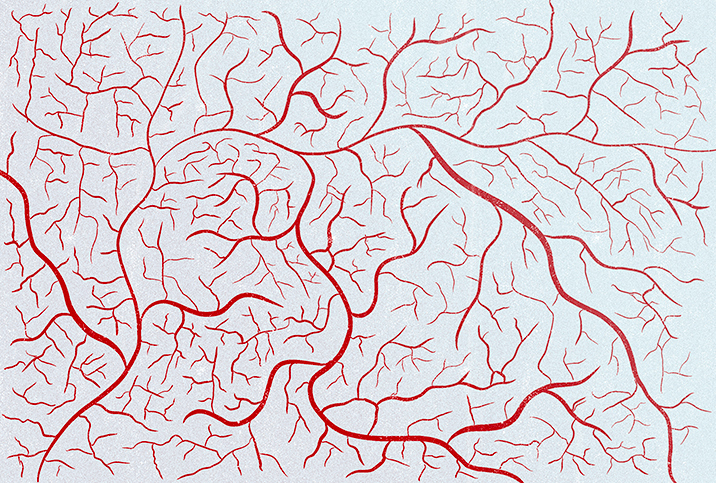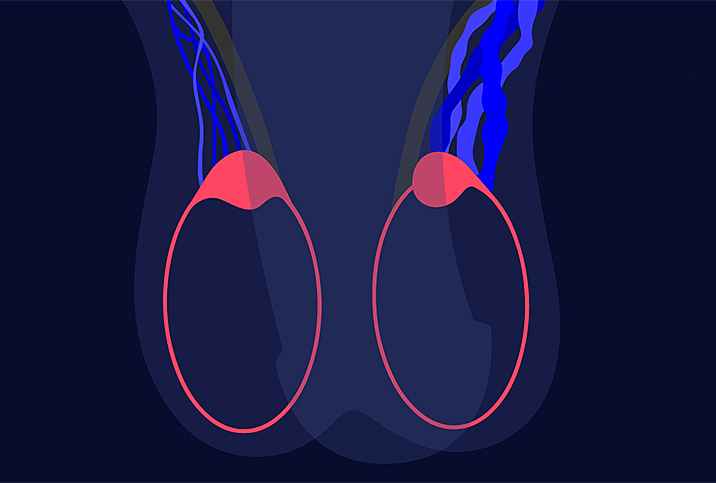What Women Need to Know About Varicoceles

Most women, whether they have experienced the condition or not, are aware of varicose veins. They're painful. They cause some women emotional discomfort due to how the veins look. They're not life-threatening. They're inconvenient.
Believe it or not, men get a similar condition, in a less visible and more tender area. If your partner mentions a varicocele or you notice one, it might be time to help him help himself.
Varicoceles are dilated veins in the scrotum, a common condition that affects nearly 15 percent of men. They form when the valves in the veins don't work properly and blood collects in the scrotum, similar to how they form in the legs. Although varicoceles are not dangerous, they can hurt and cause low sperm production, decreased sperm quality and infertility. Varicoceles can also cause testicles to shrink or fail to develop.
If your partner has varicoceles, look for these symptoms and be prepared to help alleviate any pain or stress. Pain can increase as the day goes on, especially if your guy is standing or exerting himself physically for work or exercise. If this is the case, help him relax by encouraging him to lie on his back. If you notice that one testicle (usually the left one) is larger or swollen, but he hasn't been diagnosed with varicoceles, suggest he discuss the subject with his doctor.
Grading varicoceles
There are four grades or levels by which varicoceles are sized, with Grade 0 being too small to detect without an ultrasound and Grade III causing a visible deformity but still possibly not needing treatment. A doctor—usually a urologist—will use this system.
Varicoceles can take time to develop and often start in puberty. Some resolve on their own and may not need treatment, especially if they cause no symptoms. However, they can raise the temperature in and around the testicles, resulting in impaired sperm production and motility. Applying cooling packs wrapped in a towel and taking over-the-counter pain medication may help the condition.
Fertility concerns
In extreme cases, varicoceles can affect testosterone production or result in a complete lack of sperm in the ejaculate, leading to infertility, according to Johns Hopkins Medicine. If you and your partner are trying to get pregnant and you suspect a varicocele, suggest that your partner consult his physician, but understand that 80 percent of men with varicoceles can conceive without treatment. It is likely that before taking any steps to repair a varicocele, you will be asked to undergo a complete fertility evaluation to rule out any other issues.
Possible serious causes
Varicoceles in and of themselves aren't dangerous, but the following signs may suggest that other factors are involved. When your partner lies down, the testicles should appear less full because gravity isn't trapping blood in the veins. If there's no change in size between standing and lying down, consult a doctor. If the varicocele develops on the right side of the scrotum rather than the left side, a tumor or mass in the abdomen may be causing a blockage, and it's time to get your guy to a urologist for a careful examination.
Treatment of varicoceles
The spaghetti-like mass of varicoceles generally doesn't require treatment unless there is ongoing pain in the scrotum or a couple is trying to conceive and it's determined that a varicocele is the cause of infertility. Repair is based on the size of the varicocele and any discomfort it causes, the couple's fertility goals, and issues such as erectile dysfunction caused by decreased testosterone levels. Semen analysis and blood tests are the go-to examinations at the start. The repair can be done surgically, cutting the varicocele to eliminate blood flow to it, or with a nonsurgical procedure called percutaneous embolization, which involves the use of a catheter and a balloon, coil or medicine to block off the varicocele.
Varicoceles aren't life-threatening, and most men can live with one and will never even notice they have it. On the other hand, 40 percent of men tested for fertility issues have a varicocele, so there is a correlation. After surgery, half of the couples have been shown to conceive naturally without assistance. Whether you're trying to get pregnant or you just notice an irregularity on his scrotum, encourage your partner to visit his doctor, get a diagnosis and determine a course of treatment, if necessary.

















